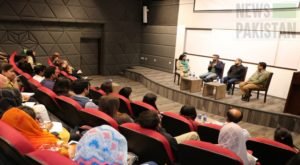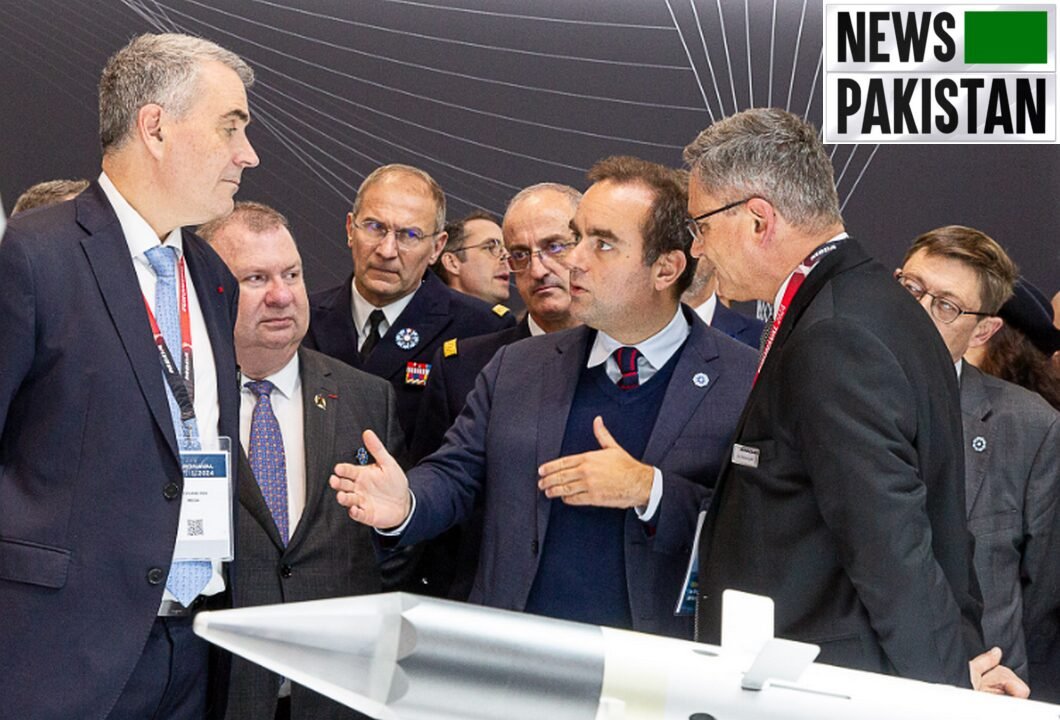KARACHI: The Institute of Business Administration (IBA), Karachi’s Journalism Society organized a panel discussion on Is there a future for Media to discuss the future of Media and journalism in Pakistan as part of a series of events to explore how aspiring journalists can capitalize on the trends in the global Media industry.
The panelists of the talk included Senior Executive Producer at Geo News, Gibran Peshimam and CEO of Soch Videos, Sofyan Sultan. The event was attended by a large number of Media and journalism students from the University of Karachi, Institute of Business Management and the IBA Karachi.
Speaking on the occasion Peshimam opined: “One needs to be mindful of the platform where a certain content is being published. Social media platforms have their own guidelines and those guidelines also change and evolve. The important art today is to fashion your content after those guidelines without compromising on the quality, authenticity and impartiality of it.”
In response to one of the questions from students, Sultan said that a diverse skill set is the need of the hour. “The industry is evolving fast and one needs to employ different media such as videos and podcasts. It helps your story to reach a greater audience.”
A relevant piece published earlier:
Int’l Conference on Information commences at IBA
KARACHI: The first day of the flagship conference, the 8th International Conference on Information and Communication Technologies (ICICT 2019), organized by the Faculty of Computer Science (FCS) at IBA here started off with an inauguration ceremony at the city campus.
The ceremony started with an opening address by the Acting Executive Director, Dr. Sayeed Ghani. He explained how the conference had grabbed the attention of researchers from across the world, due to which the conference has received papers from North America, China, the Far East and Europe. He also congratulated the FCS on successfully pulling off the first day of the conference.
Chairperson of FCS, Dr. Shakeel Ahmed Khoja also addressed the audience to explain more about the history and structure of the conference. He further stated that 80% of paper submissions were based on application development, while 20% were based purely on research. The speakers from across the world were invited to share their perspective on Next Generation Technologies − the theme of the conference this year.
Director Urban Analytics Institute Murtaza Haider; Dean, University of Glasgow UESTC, Dr. Muhammad Imran; Associate Professor at Information Technology University (ITU), Lahore, Dr. Adnan Noor Mian; and Dr. Gus Gutoski conducted keynote sessions and shared their experience about how Machine Learning, IoT, BigData, and Artificial Intelligence can help solve real world problems and make this world a better place to live.
Two sessions of tutorials were organized to provide a hands-on learning environment for the students. The technical papers sessions were organized for the researchers to present their findings in front of the chief guests and students.

Impacts of climate change on security discussed at IBA
KARACHI: The Karachi Urban Lab, a research organization based at IBA here led by Professor of City and Regional Planning Dr. Nausheen H. Anwar, hosted an event as part of the French and German Embassies’ joint lecture program Open Doors.
Christine Rosenberger from the German Embassy, Islamabad joined Dr. Anwar in introducing the panel discussion, titled Climate Crisis Seminar, which is the first event of this series.
Dr. Nausheen H. Anwar spoke from the perspective of an urbanist situated in Karachi, who studies not just Karachi but also other cities across Pakistan and the Global South. She asked about the role of the city in the climate crisis, especially considering the ambiguities and complexities of the impacts.
She pointed out how the government had developed and implemented policies that are actually antithetical to the change that must be undertaken. In particular, Dr. Anwar highlighted how structural inequality compounds the impacts of the climate crisis, and how the present understanding of “resilience” is not adequately taking this into account.
Executive member Shehri-CBE Farhan Anwar, highlighted the numerous climate change challenges faced by Karachi and Pakistan. Pakistan is ranked 8th in terms of countries most impacted by climate change and Karachi faces significant challenges such as extreme heat, sea level rise, and flooding. In light of these challenges, Anwar argues that Karachi must undertake more effective climate change adaptability measures.
Adrien Detges and Bastien Alex joined the two speakers on stage for the panel moderated by Afia Salam, a journalist and geographer. Detges spoke about his work with Adelphi in Berlin, an organization that researches climate change, security, and development. He spoke about Adelphi’s compound climate-fragility risks framework, which accounts for how climate change is a risk-multiplier for factors such as state fragility, social unrest, and migration.
Alex, who works for the French Institute for International and Strategic Affairs, spoke about the importance of working with the military with regard to climate change’s impacts on security. The military, he claimed, plays an important role in disaster management. Both Detges and Alex spoke about the importance of awareness at the institutional level about the impacts of climate change on security.
News Pakistan










